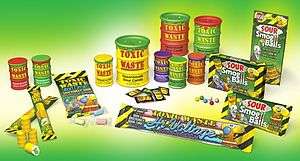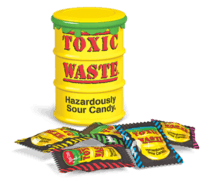Toxic Waste (confectionery)


Toxic Waste is a line of sour candies sold in the United Kingdom, the United States, Canada, South Africa and Ireland.[1] The toxic waste candy is packed in novelty drum containers, each holding 16 pieces of sour candy which come in five different flavors. The Toxic Waste Sour Candy brand is owned and marketed by Candy Dynamics Inc of Indianapolis, Indiana.[2]
Production and distribution
Some Toxic Waste products have a hard, sour exterior and a sour liquid filling.[3] Toxic Waste candy products are made in Mexico, Pakistan[2] and Turkey. The product is distributed in the United States,[2] United Kingdom,[4] Europe, Canada,[2] South Africa and other countries.
There are five original flavors, namely apple, black cherry, watermelon, lemon and blue raspberry.[5] A purple container was also brought in, containing the flavours blueberry, blackberry, black cherry and grape. In addition to the purple drum, five new flavors were introduced in the red drum variety: raspberry, cranberry, red pear, strawberry and red grape, and a further five flavours - lime, kiwi, melon, green apple and green pear - were introduced in the green drum.[5] The brand also includes Smog Balls,[5] Goop,[5] Hi Voltage Bubblegum,[2] Short Circuits Bubblegum,[2] Toxic Waste Gum Balls, and Mutant Gummy Worms. In 2007, the Nuclear Sludge chew bar variety was introduced, but it was not as popular with consumers compared to the other varieties.[2] Nuclear sludge attained sales of $32,000 in 2010.[2] Another product is Toxic Waste Sour Candy sprays.[4]
Nutritional information
Calories-50, Total fat 0 g, Sodium 0 mg, Total carbohydrates 13 g, Sugars 11 g, Protein 0 g.
The "sour challenge"
The container features a challenge how long buyers can keep a sweet in their mouths.[3] The manufacturers encourage buyers to compete against a friend. There is a caution on the drum stating that sensitive individuals should not consume the product. Chicago Sun-Times reporter Kevin Allen notes that the candy gives some palatable sweetness after the initial strong sour flavor in the mouth.[6]
Recalls
In January 2011, the U.S. distributor of the Toxic Waste Nuclear Sludge chew bar variety recalled the product, which was manufactured in Pakistan, due to lead contamination.[2] At the time, the U.S. Food and Drug Administration (FDA) announced that it was unsafe to eat due to this contamination.[2] The contamination was first detected by the California Department of Public Health, which found lead content in the candy at 0.31 parts per million, above the FDA maximum of foods being required to be below 0.1 parts per million.[2]
In March 2011, the FDA determined that Toxic Waste Short Circuits bubble gum brand products imported into the U.S. from Pakistan had amounts of lead that exceeded FDA-allowable levels.[7] The FDA determined that the product had 0.189 parts per million of lead.[8]
See also
References
- ↑ John Ewoldt Stuff that stocking with a little sass- Gift ideas from the fun (Carpet Skates) to the heartfelt (Westy Copeland's "happy paintings") December 13, 2007 Star Tribune
- 1 2 3 4 5 6 7 8 9 10 11 "Shockingly, Toxic Waste Candy Bars Deemed Unsafe". CBS News. January 28, 2011. Retrieved April 15, 2015.
- 1 2 Goldstein, D.; Mintz, S.; Krondl, M.; Rath, E.; Mason, L.; Quinzio, G.; Heinzelmann, U. (2015). The Oxford Companion to Sugar and Sweets. Oxford University Press. p. 247. ISBN 978-0-19-931361-7.
- 1 2 "Toxic Waste candy expanded in UK". Talking Retail. Retrieved April 15, 2015.
- 1 2 3 4 "Candy (varieties)". Toxicwastecandy.co.uk. Retrieved 15 April 2015.
- ↑ "(No title accessible)". Chicago Sun-Times. Archived from the original on October 17, 2009. Retrieved 15 April 2015.
- ↑ Edition, Morning (April 1, 2011). "Toxic Waste Candy Lives Up To Its Name". NPR. Retrieved April 15, 2015.
- ↑ "Candy Dynamics Recalls Toxic Waste® Short Circuits™ Bubble Gum Net wt. 3.2 oz. (90g) Package --- Lot # 15070SC12". U.S. Food and Drug Administration. March 26, 2011. Retrieved 15 April 2015.